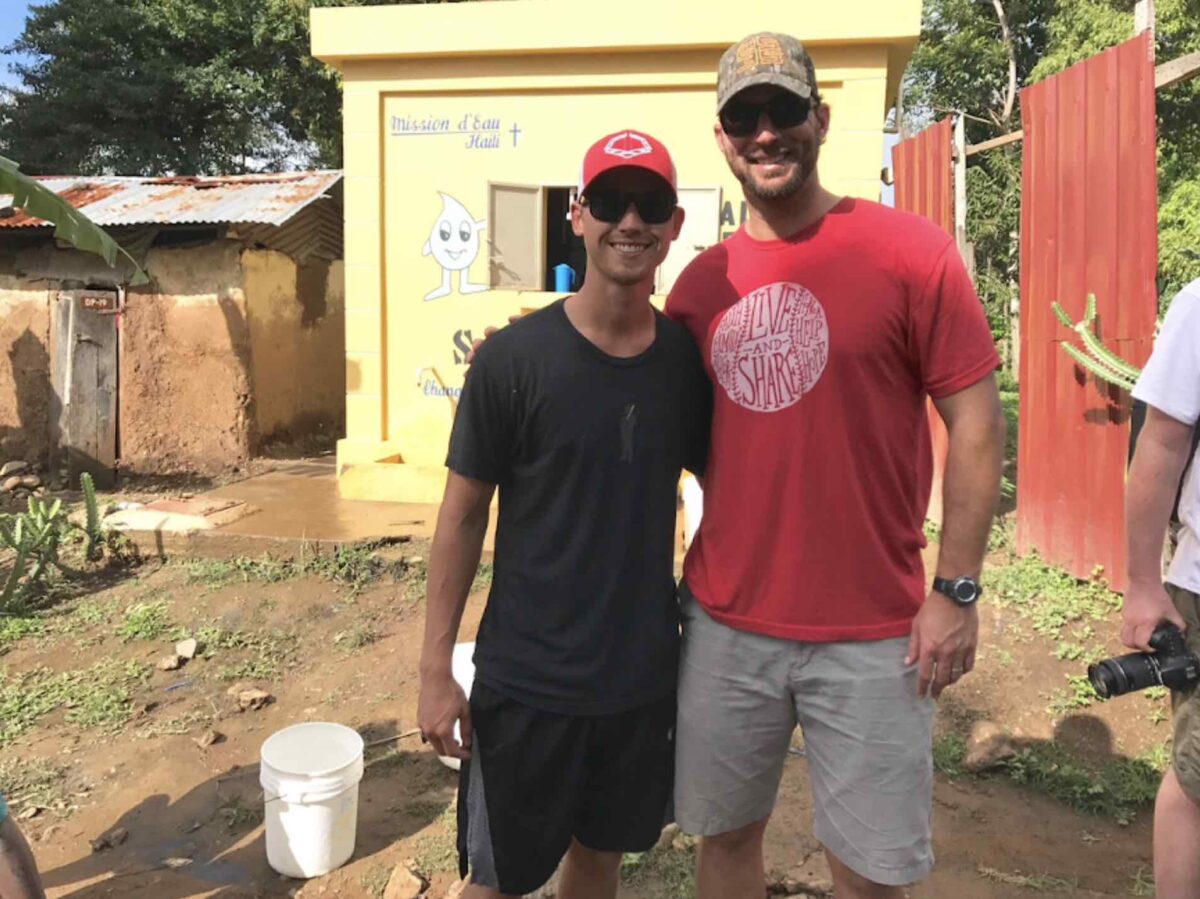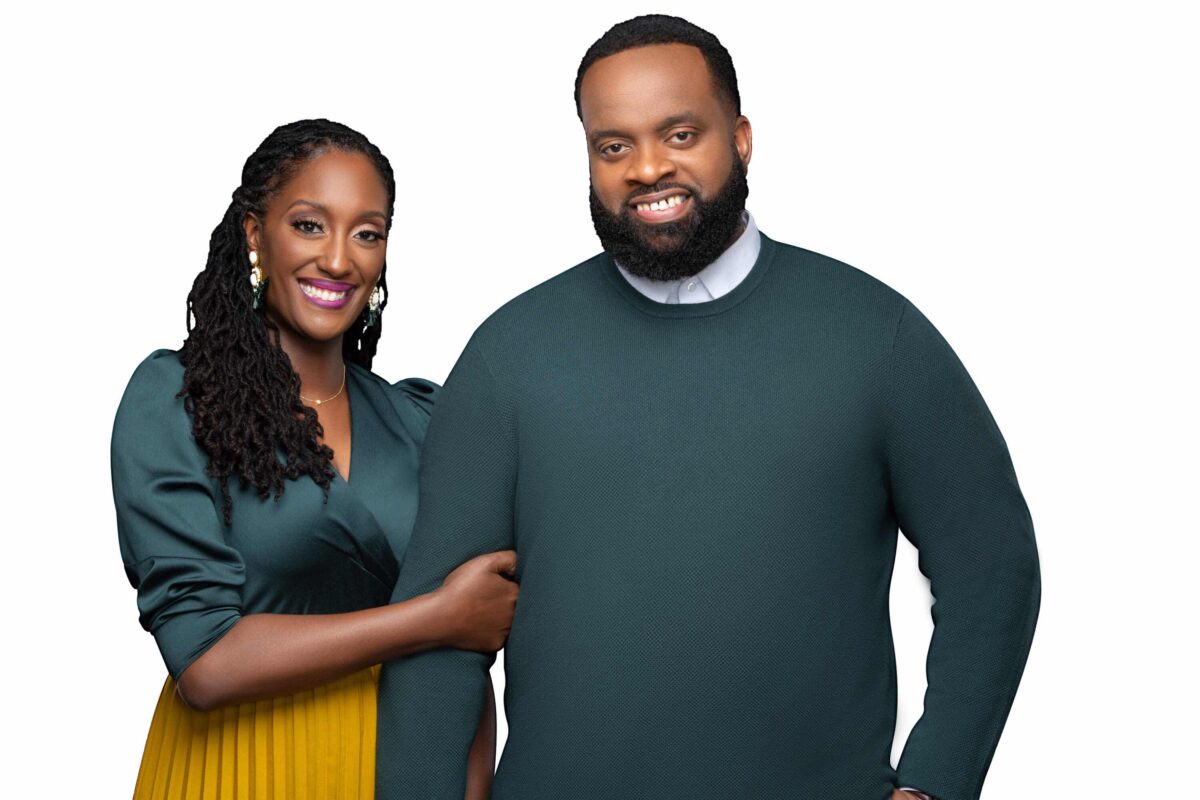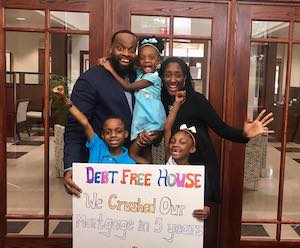God Is There, Even at Your Breaking Point: Luke Weaver and Talaat & Tai McNeely

Luke Weaver: We’re vulnerable, we’re seeking counsel. We’re seeking some type of comfort in some type of way. And the easiest answer for me has just always been the Word and prayer and really pushing to make that a priority. Because I’ve had my moments where I’ve tried to do it myself and it’s just the most brutal plan. It’s sloppy and it’s just not built on any type of firm foundation.
God Is There, Even at Your Breaking Point: Luke Weaver and Talaat & Tai McNeely – Episode #344
Narrator: Welcome to the Jesus Calling Podcast. Life throws a lot of stuff our way, both good and bad. But have you ever found yourself at that wall when you know that if one more thing comes your way, you’re going to explode? We don’t fully understand why God allows us to reach those breaking point moments, but we can know that He loves us and we can trust that He is a refuge from the worst of storms in our life.
Luke Weaver is a newly-signed pitcher for the Cincinnati Reds, after recently playing for the Kansas City Royals. Luke got attention beyond his athletic talents in the league for the special glove he wears designed to look like an old-school Bible. It reminds him of God’s promise to stand by him in any situation. Talaat and Tai McNeely are a married couple who faced a fork in the road when Talaat came clean about his less-than-ideal financial situation just before they were married—and how they had to rebuild trust with each other in their understanding and communication, and now, how they help others facing the same mountain.
Let’s start with Luke’s story.

Luke: My name is Luke Weaver. I’m a Major League Baseball pitcher and hope to continue to do so for a little bit longer.
Growing up in DeLand, Florida, as a young kiddo, baseball was an aspiration and something that I dreamt of and got into really early. It probably wasn’t until about late high school that some exposure started picking up, and [I] was able to get a verbal [offer] and then signed with Florida State University.
Through the journey to where I am now, the dedication and the time I’ve spent—the sacrifice of the long weekends, the baseball tournaments, the gear, the money spent—I always remember my dad working the 8:00 to 5:00 in this construction business, and he’d come home and I’d be done with practice at the field. And he just always mentioned, “Hey, do you want to go practice some more?”
Of course, a lot of times I was groaning about it. Like, “I’m tired,” I’m this and that. But there was a dedication from him that always motivated and inspired me to keep pushing for more. And I think those added up into a mindset, into physically and mentally getting me to the big leagues and being there as long as I have. Hopefully I continue to keep pushing through the ups and downs and making memories and a career out of it.
Luke’s First Year in MLB
The first year in Major League Baseball was a whirlwind, to say the least. It came with so much excitement and so much awe, just marveling at the new stadiums. But every ballpark came with new feelings and new moments and taking pictures and just really soaking it up, along with facing guys that you’ve watched on TV for so long. You just kind of add all that in together and then you’re just like, Man, this is this is really cool.
“Every ballpark came with new feelings and new moments, taking pictures and really soaking it up, along with facing guys that you’ve watched on TV for so long. . . . You’re just like, Man, this is really cool.” – Luke Weaver, on his first year in the MLB
But on the other side of that comes with having to face those guys and being in front of 40,000 to 50,000 people, trying to navigate through those pressures and challenges of just competing. And the hardest part about getting to the major leagues—obviously, besides getting there—is to stay there. You want to do the best you can to be consistent down the field. So where you’re living, making friends, trying to fit in, and more than anything, just performing is something that you’ve got to quickly navigate through and to make sure that you’re well equipped and doing all the things you need to.
“The hardest part about getting to the major leagues—obviously, besides getting there—is to stay there.” – Luke Weaver
Luke Finds a Faith-Filled Mentor

A big person of influence [for me is Saint Louis Cardinals pitcher] Adam Wainwright. As a young twenty-two-year-old coming up my first year—he’s been a veteran for a while now, but he just put me under his wing. We had very similar mindsets. He’s a strong believer. He showed all the things, all the qualities and things I would want off the field, charitable involvement, how to carry [myself] around the locker room, and a fierce competitor on the mound.
I kind of gravitated toward him, and he helped out a ton. That built a strong relationship over the those couple of years, and we were able to take mission trips overseas to Haiti and the Dominican Republic and be a part of something bigger. It really just opened up my eyes to the bigger picture of this world and the help that it needs. I think I’ll forever be grateful for that.
It Could Have Been Worse
There are these moments where it [feels] like I’m being challenged, but God won’t let me get to the breaking point. He’s like, “Look, this is what could have happened, but I’m not allowing that to [break you]. Because I need you to be able to go through this process and to learn from it and to build from it.”
“There’s these moments where it [feels] like I’m being challenged, but God won’t let me get to the breaking point.” – Luke Weaver
I’ve had a few injuries. With my elbow, they’ve diagnosed it as a flexor strain, a ligament strain. In baseball, the scary injury is the Tommy John injury, which is a ligament in your elbow that ends up tearing. And it’s about a year recovery. I just barely avoided that.

And then I had a shoulder injury, they call it the subscap capsule. That’s deep down in your shoulder, there’s this little ligament that connects all the joints in there together. And I almost ruptured that. I avoided that major surgery, too.
Every time, there’s that moment of like, But it could have been worse. You know? It could have been monumentally worse. And sitting out for eight weeks as opposed to eight months or a year is a little bit different in the big scheme of things. So that’s what keeps me humble, in a sense.
God’s really doing a lot in my life right now. And He’s provided me some success in getting to the big leagues and doing these things. But I think deep down I knew along the way that some tough times are going to come. You know, I think preparing the fields for rain and knowing you’ve got to put in all the work, but it doesn’t mean that the rain is going to come. You know, it’s going to come at some point, but we’ve got to stay ready.
I’ve had some tough moments, but I sit there and I’m just like, How do I handle this? How do I go about this in a way that Jesus would handle it?
But I just know when I’m in tough conversations in that exact moment and the emotions are kind of all over the place, whether it’s angry or upset or disappointed, whatever it may be, I always just feel like this sudden presence that Jesus is with me in the room. And in that moment, it flips the switch and shows me, “This is the way you need to handle it.” Because I want to be able to go to bed that night or have a conversation with my wife or family and just be like, “This is how I could have handled it, and this is the way it was going to be handled.”
There’s a moment every single time in any conversation I’ve had where His presence was there and He guided it in the way that it should have been done. And then at the end of the night, I could sit there and say, “I’m proud of myself. I’m proud of the words that were able to flow through me. I’m proud of the way I can handle these situations because I know the long-term effect is much more impactful—not only for me, but hopefully for the person across the room and how they handle things going forward with other players or with other moments.” And I think that’s the learning experience for both sides.
“I’m proud of the way I can handle [tough conversations] because I know the long term effect is much more impactful—not only for me, but hopefully for the person across the room and how they handle things going forward with other players or with other moments.” – Luke Weaver
The Bible Glove

The Bible Glove has been an awesome way for me to show my faith, for me to have a platform on the mound and just around teammates and fans, all the way from coaches to the front office for the team. It’s something that has always been the forefront of how I show [my faith] to the world, besides living my life in a way that is as close to Jesus as I can [be] or striving to be like that.
I think this was the most monumental way I felt like I could do it. And the feedback has been incredible. I mean, I wear it playing catch before games, and I can hear fans mentioning stuff. And they take the time—if I go over and talk with them—most of them always comment on it. And whether it’s a little conversation or whether it’s one that really leads to something impactful, I think that’s the whole goal of it, just to create some conversation.
We All Need Time for Connection
I try to connect to the Word and with God on a daily basis. And I’m definitely not perfect. There’s things that try to wedge in between those times, and that’s the discipline of fighting for it. But a big part of these devotionals or the reading is connecting with people. And that’s a big part of these last few years for me, to have these group chats, to have teammates, and to have a chaplain—there’s a chaplain for every team in the big leagues. You have your own chaplain, essentially. And so a lot of times having him lead in the group chat and just being a sounding board and creating wisdom, that’s a huge part of it that comes daily with reading.
You’re going, “Okay, what did you guys get on this today?” And so there’s just a conversation that builds. And if you didn’t read that day, you’re going, Oh, man, I got twenty messages sitting here.
You go to work and you follow a schedule or you have a routine, like you do those things. But part of that needs to be reading time, praying with God, or whatever that amount of time is. It is a discipline. That is something you got to be held accountable on and you’re never too busy just to set aside that intentional five minutes, ten minutes, fifteen, whatever it may be, and then start to build from that and to allow that to be something that is a priority. Jesus Listens, January 10th:
Dear Jesus,
Please help me learn to appreciate difficult days—being stimulated by the challenges I encounter rather than becoming distressed. As I journey through rough terrain with You, I gain confidence from knowing that together we can handle anything. This knowledge is based on three blessings: Your Presence continually with me, the Bible’s precious promises, and my past experiences of coping successfully by depending on You.
I need to remember that though my circumstances change immensely, You remain the same throughout time and eternity. Moreover, in You I live and move and have my being. As I live close to You—aware of Your loving Presence—I can go confidently through my toughest times.
In Your worthy Name,
Amen
Narrator: To keep up with Luke as spring training begins with the Cincinnati Reds, follow him on social media.
Stay tuned to Talaat & Tai McNeely’s story after a brief message.
Listen to inspirational prayers with the Jesus Listen audiobook
Jesus Listens is the prayer devotional book from Sarah Young helping people everywhere deepen their relationship to God through prayer. Now you can hear these daily prayers with the Jesus Listens audiobook!
The Jesus Listens audiobook contains daily, short, heartfelt prayers and is the perfect way to connect with God on a daily basis that fits your busy schedule. You can listen from anywhere –during a morning commute, an afternoon walk, or as part of your regular meditation and reflection time.
Check out the Jesus Listens audiobook on Audible, Apple Books, or wherever you listen to audiobooks.
Narrator: Our next guests are husband and wife team Talaat and Tai McNeely, who have made it their life’s mission to help others find financial freedom after experiencing their own troubles when they were newly engaged. While going through pre-marital counseling, Tai—an investment banker at the time—learned of the mountain of debt Talaat was in, and they had to rely heavily on prayer to help them find the strength to remedy their situation and move forward on a unified front.

Talaat: Hey, I’m Talaat.
Tai: And I’m Tai.
Talaat: And we are the co-founders of His and Her Money. We are also church planters and we do our best to try to communicate the truth of God’s Word via personal finance, education, and through our church, through traditional means of teaching the scriptures.
Tai: That’s right. We are a husband and wife duo. We’ve been married for sixteen years, going on seventeen. We have three beautiful children.
Talaat: I grew up heavily involved in athletics from as early as I can remember, all the way through the conclusion of high school, my parents made sure that I stayed active in sports, Boy Scouts, summer camps, church groups, all kinds of things. They figured if I was busy doing positive things that I wouldn’t have time to do any negative things. And education was of the utmost importance.
We weren’t rich, we weren’t in poverty. We were probably smack dab in the middle. And my parents did their best with the resources they had to give me the best opportunity to do even better in life than they were able to do.
Tai: My parents were married for about forty years before my mother went home to be with the Lord. My parents were also a middle-class income household. We didn’t necessarily get everything that we wanted, but we never went without. So that was always a blessing, too, growing up.
Because I was one of five, I couldn’t really participate in a lot of activities outside of school and things like that because it cost money. My parents were very, very conscious of how they spent their money. But I was very active in church growing up. I absolutely loved going to church. If I missed one Sunday or one Bible study throughout the week, I would literally cry because it was really my world. I was a part of the choir, the junior board, and things like that. So church really took a lot of my time and had my attention.
Talaat and Tai’s Meeting from the Heart
Tai: My family moved from one city to the next. And at that particular high school, I met Talaat. I was a freshman in high school, and he hit me with a dodgeball in gym class.
Talaat: A few of them.
Tai: Oh, my gosh. Actually, I was a very prophetic child, and I didn’t really know what that was at that young age. But God actually did put you on my heart. When I went home for the summer in high school, I thought about you all summer, and I knew that you were probably going to be “the one” and be my husband eventually. I was not allowed to date, so I didn’t have, like, the googly eyes. I didn’t have the heart patters and stuff like that for you. None of that existed, but you were definitely on my mind.
Talaat: So Jesus [was] calling, telling you that I was your husband way back in the day.
Tai: Yes.
Talaat: The truth of the matter is, we had spent some time post-high school apart from each other. I entered into the military and she went to college, and so we were in two different places. I was in Texas, she was in Chicago, and I was making a lot of terrible decisions with my finances. I was out of the house and living on my own and having money of my own for the first time, and I just didn’t know what to do with it. And so I created a mess. I racked up over $30,000 worth of debt.

And then as the story continues on. We reconnected, and we got to the point where we were about to get married. And here I was about to be someone’s husband, a leader of a household, and my finances were in disarray. So I thought erroneously that the best thing I could do was to hide it and try to clean up the mess on my own before we got married so that I wouldn’t drag it into the marriage. But I was lying about it.
We were having premarital counseling, and we were being taught what to talk about with each other. One of those things was finances. And so when it would come up in conversation, I would lie, I wouldn’t be honest. And it got to the point where the mess that I was trying to clean up on my own silently, the plan wasn’t working because God wasn’t going to allow it to work. We couldn’t build the foundation that we were about to embark on with the lie. And so really, I was backed into a corner.
“It got to the point where the mess that I was trying to clean up on my own silently . . . We couldn’t build the foundation that we were about to embark on with the lie.” – Talaat McNeely
Talaat: I wasn’t courageous, I wasn’t honorable. It just got to the point that I had to come clean. I had to stop lying. And I was afraid that if I told her the truth, that I would lose her, because her financial situation was much different than mine was.
Tai: I put myself through college completely debt free. I absolutely despise debt. So I have to kind of tell that picture first because and share that story because I was very financially stable. I believe that it had to do with my upbringing and in my mind.
I had assumptions. I knew that Talaat left high school. He went to go be in the military, and I knew that he was getting a nice check from the government. So I knew that he didn’t have a lot of responsibilities because the military put him up in housing and things like that. So I thought that he was stacking the Benjamins. I thought that he had a nice, fat savings account. But actually it was the opposite.
Talaat: So we got to the point where I had to open up, tell her the truth. And we almost didn’t get married, not because of the money aspect, but because of the trust being broken. I wasn’t being honest. I had told the opposite of what the reality was.
Tai: When we went through premarital counseling, that’s where everything really came out. We pulled credit reports. I highlighted things, I asked the questions. I thought that I did everything correctly. But once he came and told the truth, I was devastated. I was absolutely devastated. I was an investment banker. And so here it is, I was helping other people with their finances, and I couldn’t even help my own fiance because he didn’t allow me to come in to assist him.
But little do you know, I was ready to embrace his debt. I was ready to help him throughout the journey.
Talaat: It took a lot of prayer and a whole lot of conversation for us to come back together and walk down that aisle and continue to move forward with our lives together after the truth of the situation came out.
“It took a lot of prayer and a whole lot of conversation for us to come back together and walk down that aisle and continue to move forward with our lives together after the truth of the situation came out.” – Talaat McNeely
Getting on the Same Page

Tai: So the way that we started our marriage, we thought that we started off on the right foot because Talaat came up with the bright idea and I agreed, “Hey Tai, you’re better with the money and finances. How about you handle the money in our relationship, and you just tell me how much money I can spend every week?” I thought that it was a great plan. Because again, I enjoy the numbers. I enjoy creating budgets and things like that. And so we did that for probably, I’d say, the first three to six months of our marriage. But little did we realize that was a big mistake because it started to build strife and tension within our relationship.
Talaat: Yeah, so it had to start, I believe, with humility. It had to start with searching for common ground.
So now, we had to reevaluate the situation. We weren’t doing things the right way because we weren’t communicating. We weren’t telling each other how we really felt. And so we ended up in a similar situation, although it looked better on the surface. But we had to communicate, “You know what? This thing that we’re trying, it’s not working because we’re both not playing our part.” She was doing all the work, I was doing a lot of complaining, and so we had to have that conversation. I had to say, “Well, I feel like I’m getting a handout.” And then she had to say, “Well, I feel like I’m doing all the work and not being appreciated for the work that I’m doing to help clean up the mess that you created.” So it was through those conversations that we realized that although we both have strong suits in this equation, we both still have to play our part.
And it doesn’t mean that everything you do has to be 50-50. It just couldn’t be 100-0. Sometimes it looked like 60-40 or 70-30. Sometimes it did look like 50-50. But we had to move away from the 100-0 ratio that we had going on. And that’s how we were able to bring our opposite personalities and styles together, was through critical conversations and honest and transparent conversations to get on the same page.
Tai: I went to prayer. I went to God in prayer. I involved the Lord in our decision making. “Lord, what should I do? How should I walk this out?” And then once God began to deal with my heart, I was able to embrace the journey. So we allowed prayer to be really the pivotal part in our marriage. “Lord, how do we budget together?” And so we had to involve prayer in how we walked that out.
“I went to God in prayer. I involved the Lord in our decision making. “Lord, what should I do? How should I walk this out?” And then once God began to deal with my heart, I was able to embrace the journey.” – Tai McNeely
Doing the Hard Work, But Still Dreaming
Talaat: And then we added—on top of prayer—we started to dream. We started to look at what we wanted our life to look like in the future. Here we have a clear understanding of where we stand. We have this amount of debt. We’ve got these bills, we have this income. But what are we doing this work for? That’s important, because there’s an old saying that goes, “If you aim at nothing, you’ll hit it every single time.” And so we began to write goals. We began to dream really big and ambitiously, as though the God of the universe that we serve could do anything. And so that became fuel for us.
“There’s an old saying that goes, ‘If you aim at nothing, you’ll hit it every single time.’” – Talaat McNeely
Talaat: We were budgeting because we’re trying to get ourselves to a place of financial freedom. We were making sacrifices. We were taking our lunch to work because we’re trying to create margin that helps us to get out of debt quicker. But the reason why is because this life that we are pursuing, we’ve got to do some hard work now that will allow us to have many more options down the road.
So you can’t just go out and try to do the work itself, because you won’t have staying power. You’ll get frustrated, you’ll see other people doing things and you’ll want to do those things. But if you have a goal, a target that you’re aiming at, if you take the time to dream and give yourself concrete goals and benchmarks that you’re trying to hit, the hard work becomes less hard because you know that the progress that you’re making is actually leading you somewhere. So that was imperative for us as well.
“If you take the time to dream and give yourself concrete goals and benchmarks that you’re trying to hit, the hard work becomes less hard because you know that the progress that you’re making is actually leading you somewhere.” – Talaat McNeely
Talaat: For me, it impacted my faith, because for so long, I felt hopeless in this area. I felt like I had these gifts and these strengths in other areas. But when it came to my money, I just could not figure it out. I finally submitted to His process and His will for my money. And because we began to follow the path of what the Scriptures say, what the Bible actually says about money, I saw the change that I have been striving for for so long. And then it made me realize that, man, lining your life up with the Scripture is the key. And it made my faith even stronger.
Because, man, if He allowed me to overcome this mountain, there are some other mountains that He can help me with as well.
“If He allowed me to overcome this mountain, there are some other mountains that He can help me with as well.” – Talaat McNeely
Tai: One scripture that comes to mind for me is John 8:32: “You will know the truth and the truth will set you free.” We became debt free our first year of marriage. That was a huge accomplishment. And we know without a shadow of a doubt that we could not have done that if Talaat did not come clean.
When God pricks your heart in the area—and again, we’re talking about finances—it’s because He wants to do something in your life. He doesn’t want your finances to be a burden, and He actually wants it to be a blessing. He uses you to be able to give and do things for others that you wouldn’t be able to do if you were full of debt. And so Talaat and I didn’t really know the magnitude of what taking this step will lead to.

Now, seventeen years later in our marriage, here it is the Lord allowed us to plant a church. And we often talk about and discuss this, would we have been able to do this so freely if we had so much debt? We’re not so sure that we would have been able to.
So God’s way is always the best way. Listening to Him, again, leaning into prayer, asking Him, “Lord, Order my step. Show me how to do this. I don’t know how to do this, but show me how to do it.”
Talaat: The Bible clearly tells us that with man, it’s impossible. But with God, all things are possible. So it starts with your level of faith, not in yourself, not in your talent, skills, or ability, but your level of faith and the faithfulness of the God that you serve. He doesn’t want you to be bound. He doesn’t want you to be shackled. He doesn’t want you to be full of anxiety about your finances. He wants you to be free. But there is work that you have to do.
“God doesn’t want you to be full of anxiety about your finances. He wants you to be free. But there is work that you have to do.” – Talaat McNeely
Talaat: That’s number one, up your level of faith and your level of execution based on the Word of God. Number two, just know that you are not alone. Because sometimes, the devil just loves to make you think that you created such a mess for yourself that’s so unique and unheard of and unreal. And that’s why we created our platform, to demonstrate all kinds of examples of all different people in all different situations who all came to the same destination of freedom financially.
So when you take your faith, when you add action, and then you allow yourself to realize that this is something that has been overcome by others, therefore it can also be overcome by me, then you have some energy and some staying power to do what’s necessary to get from the place that you are financially to the place that you want to be.
Narrator: To learn more about Talaat and Tai, please visit www.hisandhermoney.com.
If you’d like to hear more stories about faith amidst uncertainty, check out our interview with Janine Urbaniak Reid.
Next week: Sister Jean Schmidt

Narrator: Next time on the Jesus Calling Podcast, we’ll hear from 103-year-old nun Sister Jean Schmidt, chaplain for the Loyola Ramblers men’s basketball team, who played a critical role in the team’s success. Sister Jean strives to wake up with purpose each and every morning, and lives her life in a way that has inspired countless people across the globe.
Sister Jean Schmidt: In the morning I wake up, and I thank God for bringing me to this day. Then I say, “Please help me to do everything for Your honor and glory.” And that’s my great purpose in life, is to serve God and to be faithful to Him and to help people.


